conductor resistance fixture suppliers
Understanding Conductor Resistance Fixture Suppliers
In the realm of electrical engineering, the significance of accurate measurement cannot be overstated. One of the critical components in ensuring precise electrical measurements is the conductor resistance fixture. These fixtures are essential for testing the resistance of various conductive materials, allowing engineers and manufacturers to ensure product reliability and performance. With the growing demand for high-quality fixtures, the role of conductor resistance fixture suppliers has become increasingly important.
What are Conductor Resistance Fixtures?
Conductor resistance fixtures are specialized devices designed to measure the electrical resistance of conductors, such as wires and other electrical components. These tests are vital for understanding the quality of the conductor material, its capacity to carry current, and its overall performance in electrical applications. The fixtures typically incorporate highly accurate resistive measurement devices and connectors that hold the test samples securely in place during testing.
These fixtures can vary in complexity, from simple hand-held devices to sophisticated automated systems that interface with computer software for data analysis. The choice of a fixture often depends on the specific requirements of the testing environment and the types of materials being examined.
The Importance of Reliable Suppliers
When it comes to conducting resistance measurements, the quality of the fixture is paramount. Therefore, selecting a reliable conductor resistance fixture supplier is crucial. A reputable supplier should provide
1. High-Quality Products Fixtures must be built from durable materials and designed to withstand the rigors of repeated testing. High-quality fixtures will ensure accurate and consistent measurements.
2. Custom Solutions Many applications require specialized testing conditions or unique sample sizes. Reliable suppliers should offer customizable fixtures tailored to specific needs, ensuring that the testing process meets industry standards.
3. Technical Support Suppliers should provide excellent customer support, including guidance on installation, maintenance, and calibration of the fixtures. This support is vital for ensuring that users can effectively utilize the products.
4. Compliance with Standards It is essential that the fixtures meet relevant industry standards and regulations, such as those from ASTM, IEC, or ISO. A good supplier will ensure that their products comply with these standards, thereby guaranteeing the reliability of the testing process.
conductor resistance fixture suppliers

5. Training and Resources In addition to providing fixtures, suppliers should offer training resources to help users understand the intricacies of resistance testing. This can include manuals, online tutorials, and workshops.
Key Features to Look for in a Fixture
When evaluating different conductor resistance fixtures, consider the following features
- Connection Types Ensure that the fixture supports the connection types needed for your test samples. Common connection types include banana plugs, alligator clips, and specialized terminals.
- Measurement Range The fixture should cover the range of resistance values you expect to encounter. Fixtures with a wide measurement range will offer more versatility across different applications.
- Portability Depending on your needs, consider whether you require a portable fixture or a more robust stationary unit. For fieldwork, lightweight and compact designs are advantageous.
- Calibration Options Look for fixtures that offer easy calibration procedures to maintain measurement accuracy over time.
- Data Output Some advanced fixtures come with data logging capabilities or connectivity options that allow for seamless integration with computers for data analysis and storage.
Conclusion
The reliance on electrical conductors in various industries necessitates precise measurement of their resistance characteristics. As such, conductor resistance fixture suppliers play an essential role in the quality assurance processes of electrical engineering. By choosing a reliable supplier that offers high-quality, customizable products, technical support, and comprehensive training, businesses can ensure that their testing processes are efficient, accurate, and in line with industry standards. The investment in quality fixtures not only safeguards product performance but also contributes to the advancement of technology in an increasingly electrified world.
-
Why the Conductor Resistance Constant Temperature Measurement Machine Redefines Precision
NewsJun.20,2025
-
Reliable Testing Starts Here: Why the High Insulation Resistance Measuring Instrument Is a Must-Have
NewsJun.20,2025
-
Flexible Cable Flexing Test Equipment: The Precision Standard for Cable Durability and Performance Testing
NewsJun.20,2025
-
Digital Measurement Projector: Precision Visualization for Modern Manufacturing
NewsJun.20,2025
-
Computer Control Electronic Tensile Tester: Precision and Power for the Modern Metal Industry
NewsJun.20,2025
-
Cable Spark Tester: Your Ultimate Insulation Assurance for Wire and Cable Testing
NewsJun.20,2025
 Copyright © 2025 Hebei Fangyuan Instrument & Equipment Co.,Ltd. All Rights Reserved. Sitemap | Privacy Policy
Copyright © 2025 Hebei Fangyuan Instrument & Equipment Co.,Ltd. All Rights Reserved. Sitemap | Privacy Policy
